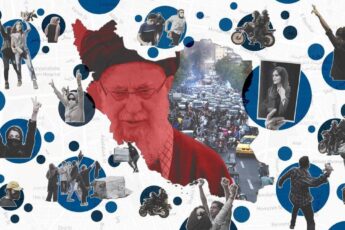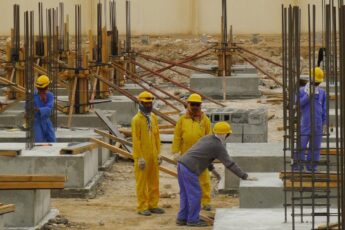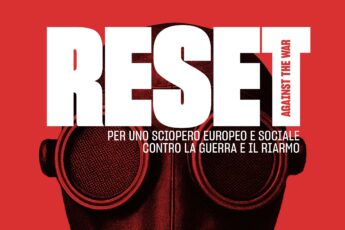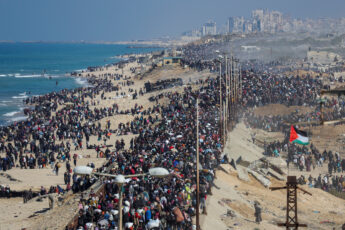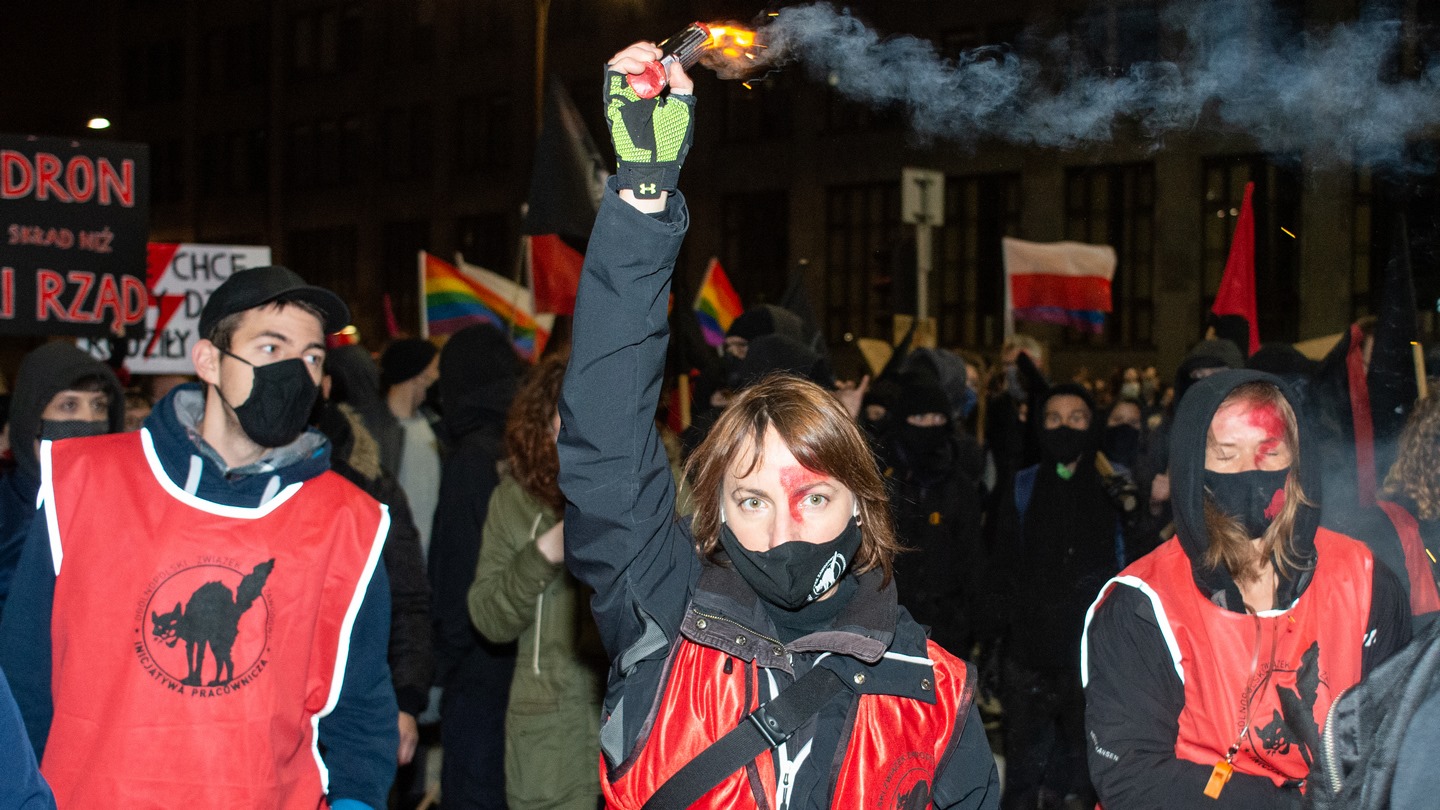
This interview with Magda Malin and Krzysztof Król from Workers’ Initiative (Poznan), whom we met in Poznan during a transnational student meeting, says a lot about how the war unfolds its effects beyond the battlefield, intertwining with the exploitation and struggles of millions of workers in Eastern Europe. The war is concretely determining the choices of Polish workers who, for better wages, join the army, or move into the industries involved in military production, or choose to migrate to escape the war. The effects of the war can be seen also in the presence of hundreds of thousands of Ukrainian refugees who, after being supported by the Polish government – which, like other European governments, prided itself on welcoming them – now find themselves working without papers and in increasingly precarious conditions that make it difficult to communicate and organise with other workers. The war in Ukraine has become part of the migratory strategy of undocumented workers who – in order not to be rejected in their countries of origin – temporarily enlist and go to fight in order to be able to return to work in Poland, retaining freedom of movement, albeit under blackmail. The multinational composition of the Polish working class and its mobility make clear the challenges of organising – increasingly difficult when its dimension is only local, or centred on workers with citizenship and regulated contracts – and those that an anti-war movement has to face, especially when the front on which it is fighting appears far away, like Gaza. As Krys and Magda’s stories show, however, war crosses borders, and so should an anti-war initiative that does not accept the sense of powerlessness it imposes.
TSS: Can you tell us about the impact of the war in Ukraine on the working conditions and about the workers’ reaction to the war policy that is invading Europe?
Krys: There are different reactions of the people depending on where they are in the process of production. On the one hand, there are some industries which hope to have more work thanks to militarization. For example, there is a Cegielski factory in Poznan in Poland in which our union started in 2004. This factory started in the 1850s and produces different technical stuff – for example wagons or engines to the ships. Even before the war, they hoped to get contracts for the armies from different countries. Militarization is considered a way to have more jobs.
Another example is the one regarding the bus drivers in public transportation. We have commission of public transport drivers of trams and busses in Bydgoszcz. Their conditions are bad, with very low wages. Currently some bus drivers from Bydgoszcz public transport joined the army as soldiers. Some of them, those who got military training in the past, can get permanent employment. They basically work as professional drivers in the army. Those without military training [which is not compulsory in Poland since 2008] get temporary contracts of one year, with the promise that they can return to their previous job or get a permanent contract under certain conditions. More concretely, they move some stuff to the Eastern border. If there is more sophisticated stuff to transport, the transport goes quite slow, they got additional money for be outside of home, for overtimes. This is a good job compared to the former conditions in the public transportations, they live in hostels and are better paid. This means that the direct employment in the army can be attractive for the workers. And as the army now gets 4% of GDP, it means that large amount of money will be directed to activities connected with it.
Another example the Territorial Defense Force. It was created in 2017 and currently there are about 40.000 units. TDF is made up of professional and part-time volunteer soldiers who are a kind of reserve for the army. Its members have some obligations, for example need to go on some military trainings, but most of the year they work as ordinary civilians. Some workers from Volkswagen in Poznan in which there is a commission of our union joined the TDF, since, according the Polish Law, it secures against firing from jobs both the worker enrolled and his wife. So, it is a kind of security for all family.
People who have been working abroad, who have migrated in the past, have another approach: because of this knowledge of how to go outside of Poland and because of some connections with other countries, they prefer to escape from the war. This is very important. After Poland joined the European Union in 2004, the labor market became more open. If you compare it to the Ukrainian labor force, there are not so many people there who have this experience and who could escape easily from the war. The Polish labor force already has this experience. For this reason, I think it can be problematic to put more pressure on the labor force in Poland in terms of militarization because people can escape more easily. They know the languages, they have this kind of experience and they have this formally open market and access to the West of Europe.
So, these different approaches which I know – and this is related to our union practice – show that some workers get better conditions of labor through militarization and, on the other hand, others totally escape from Poland and from these conditions. Of course, there’re a lot of Ukrainians in Poland, mainly in the branches of construction, gastronomy, transports, meat industry, and agriculture. On some construction sites in Poland everyone, except the office workers, is Ukrainian. Sometimes the crane operators, more skilled, are Polish, but not always. It’s more difficult to get the papers as a crane operator if you are Ukrainian. But if you had some experience in Ukraine as a crane operator, maybe you first start from the bottom as a carpenter, and then the enterprise arranges for you the immigration papers.
Close to our squat in Poznan [Rozbrat], there was a hotel that since the beginning of the war in Ukraine hosted Ukrainian families, mainly women, children and a lot of disabled people, in total about 200 people. This place – a good place, where people could stay together – belonged to the State and in the past was used for social stuff: for COVID, for example, or to host migrants from Afghanistan. After about one year, the government decided to kick them out of this hotel. The person who made this decision represented the government in the area. He was from the right wing and used the nationalist discourse to state that Ukrainians expect too much from the Polish government. However, we got the information that the real reason was that they wanted to renovate this old hotel and made instead a luxury hotel there. Ukrainians came to us and we supported them, on the first line of the protests were women. The demand was to stay in the hotel or at least to stay in Poznan, since at the beginning authorities wanted to push them in villages out of the city. Ukrainians were too weak to develop together with us and Rozbrat collective protests or the occupation of the hotel. They have been kicked out then, but thanks to our protests authorities organized for them places in Poznan and were not sent to rural areas. Maybe it’s a kind of success. So authorities used nationalist discourse that Ukrainians expect too much from Polish state, and we spoke in public debate that Ukrainians need to defend social infrastructures which are destroyed by the Polish state, that instead organizes infrastructures for western multimillionaires. Now the building is preparing for new rich guests and will be part of the Mariott network.
TSS: How’s the situation now with passports and documents? Poland promised to send back to Ukraine those who escaped but who have to enroll in the army.
Krys and Magda: The Polish government doesn’t give passports. People from Eastern European countries, like Belarus and Ukraine, have to go back to their countries to get passports. But if they go back to their countries, they probably won’t be able to come back here. So they decide to stay. And if they stay without a passport, they are kicked out and they have to work in the informal job market. Some of them decide to go to other countries like Germany or Sweden without papers. We have this situation, but mainly with Belarus people right now.
TSS: How is the situation now in logistics and factories? How are struggles going on?
Magda: It hasn’t really changed for years, so it’s still shit. As a union, we organized one strike, but this factory is situated in a small city and inside the city, so it’s totally different from all those factories and logistics centers which are established in industrial parks or special economic zones outside the city. The labor force is very divided: people come from many different areas to go to work and then they come back to their small villages. We have a new section of Zalando workers, who also started to organize. But there is no mass strike movement or mass protests of logistic or production workers at the moment.
Krys: In general it is not difficult to find a job, but the problem is that they are very bad.If people don’t like their job, they look for another place hoping that it will be better, but better means 100 euro more, or a manager with a better character. So there is some choice in terms of getting job, but differences are really small.
TSS: As a union, how do you relate to the struggles of migrants and the problems affecting their material conditions? How have working conditions changed in logistics with the arrival of Ukrainian refugees and displaced persons?
Magda: They haven’t really changed, there are no struggles with migrants except those focused more on housing issues and social benefits that were cut for those who came after the war. But in terms of working conditions, nothing has really changed.
In Amazon, there are some specific warehouses, mainly in robotics, where the majority of the workforce is Ukrainian. This implies a communication problem. Not so many people from Ukraine want to unionize with us. They’re a little bit like separate groups of workers. And then the third one is people with disabilities, basically deaf or blind, which are also separated from the rest of the workforce. Then you have Polish workers who also stick by themselves. But when we organize, whenever we organize something, we can also see that there’s people like migrants, people from Ukraine, who are not against us: when we organized ballots, people from Ukraine took part. So you see that they are much more scared than Polish people because the legal situation is much different.
Now we also have a new section of workers from Colombia who work in the wood industry, food industry and meat industry. And this is something very new for us. Most of them work here illegally and they want to organize in the union. As a union, we don’t have tools to support them. It’s more like a symbolic thing. They meet regularly, they meet with us, we can figure out something, give some advice. We support them together with one foundation, but the problem is that if they’re caught, the border police say that they have to leave the country for about six months. We’ve just learned that some of them don’t want to go to Colombia. So, when they’re caught by the police, they decide to go to Ukraine for about six months to join the army and then they come back to Poland when they can get a job again and ask for papers again. We try to cooperate with organizations that deal with migration. Right now we are discussing how to use these regulations about human traffic and how to implement them in labor issues because then they will be protected. Most of them, of course, are cheated. That’s why they are here, they are deprived of their immigration papers.
We tried to do something to protect them so that they can stay in Poland and organize in our union. Very big companies and employers that are recognized publicly, cooperate with the state and with local authorities who employ these workers via fake job agencies. The rule in Poland right now is that if you are a migrant and the employer applies for papers for you and for the permit to stay and work, you don’t have access to any information about those papers. This is quite problematic. You can only ask your employer, but you cannot ask the authorities which give you those papers. Whenever something happens, if they are injured or they are too militant, they can keep them out in a very easy way.
Coming back to Amazon, we have some Ukrainian workers who are in the union and want to organize more structurally. We will see. We are trying to make those two groups which are a little bit separate more closer. That’s why we also distribute leaflets and all newspapers also translated in Russian and Ukrainian. In Amazon we are kind of organized. We try to establish those international connections and global links. And sometimes it’s easier for us to contact people from India, for example, or to cooperate with people from the US than to cooperate with people with disabilities or migrants who work here in Poland, or basically migrants who are in Poland right now. We are discussing and we should discuss more on an international level. These people from India right now live very similar working conditions, although they get much less money and they work longer hours.
TSS: Are you in touch through Amazon Workers International?
Magda: Yes. Make Amazon Pay and Amazon Workers International. Capitalism makes us very global. We are a very global working force right now. But the problem is that the work is totally semi-skilled or unskilled almost everywhere. So, as Krys said, you can get a job, but no one wants to fight for this job so much because it’s so shit. But because it’s so unskilled, it’s also very similar everywhere. So we can use those connections to organize. During the pandemics, we cooperated mainly with people from Germany and the United States and we had common demands, and Amazon had to react. We organized locally and we had different strategies depending on the legal situations of our contexts, but we were fighting transnationally for the same things. Our network worked well: we exchanged information and experiences, we had similar demands about safety issues, pays, contracts.
TSS: Did the issue of the war in Ukraine or the war in Gaza come up in your network? Is it something you discussed?
Magda: No, not really. It wasn’t an issue for us. Like the crisis and inflation of course had a huge impact on our abilities to struggle and get paid. But we were discussing economic problems, not the war itself. What can we do about war in Israel and Palestine?
We can write a statement to support one side or the other side or to say that we are against war, but what changes? In terms of understanding of the war and this kind of conflict, it is so different from person to person that if you have masses of workers from different parts of the world, then it is hard even to get the same understanding of the problem. It would probably turn out into a huge discussion, and after the discussion we could only draft a statement because, even if we stop products in Amazon, it will not really affect the war. So we try to support our friends who are workers and this is what we do. And as a union, we are in touch with Ukrainian workers there in Ukraine. The thing is that sooner or later maybe they will be in Poland, it will be much easier to organize with them when they will be here. If you talk with farmers, they could say more about how the war impacted their world.


